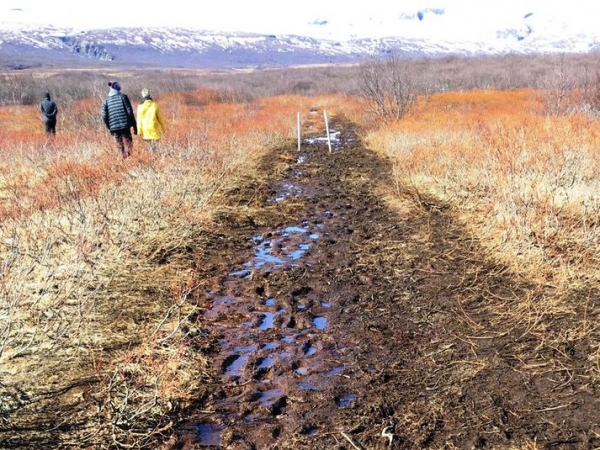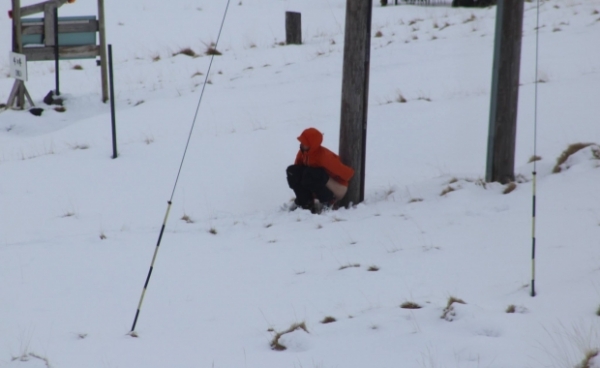The travel website The Culture Trip has included Reykjavík on a list of 11 Angry Tourist Hotspots That Are Best Avoided This Summer. The site argues that recent weeks a ave of anti-tourist protests have erupted across Europe, sparked by outrage from local residents who are voicing their anger at rising housing costs, overcrowded streets and a sense that the tourist boom benefits some more than others.
Angry locals?
The list includes cities like Venice and Barcelona, which have indeed seen angry protests from the local population, as well as cities like Milan, which the site admits has not seen any official protests against tourism so far, but where the authorities are taking steps to meet growing concerns from the local population by placing some common sense limits on tourism.
The last city on the list is Reykjavík:
Defecating in the open air, stealing road signs and even stealing a young lamb to be cooked on a barbecue are just some of the actions of tourists that have angered locals in Iceland. Tourism here has boomed since the 2008 financial crisis practically destroyed the local economy, yet recently, local residents in cities such as Reykjavik have struggled to cope with the social and environmental impact of the industry.
The inclusion of Iceland and Reykjavík on this list has raised some eyebrows in Iceland, sparking a renewed conversation about the social and economic impact of tourism.
Has tourism caused problems? Sure, of course

While it is correct that anti-social, stupid or disrespectful behavior by foreign visitors has caught the attention of locals, causing anger and frustration (who would not be frustrated at discovering a random idiot going to the toilet on his front lawn? Or in the bushes in a public park?) it is also a fact that these stories have not caused a backlash against tourism or tourists.
The most recent poll revealed that 64% of Icelanders have a positive view of foreign travellers who visit Iceland, and just 10.4% view them negatively – a drop from 11.5% in 2016, despite the fact that the number of foreign travellers visiting Iceland this year is up as much as 40%, compared to the year before.
Read more: 64% of Icelanders positive toward foreign travellers, just 10.4% hold negative views
Polls show that despite the explosive growth in tourism in Iceland in the past years Icelanders continue to be overwhelmingly positive toward tourism. And what´s more, Reykjavík residents are particularly positive toward tourism. 67.5% of the residents of the Metropolitan area said they held positive views of foreign travellers.
There is therefore no factual basis to include Iceland on a list of places foreign visitors should avoid to stay clear of angry locals.
Read more: Overwhelming majority of Reykjavík locals continues to be positive toward growing tourism
Social and environmental impact of tourism

The Culture Trip is correct, however, to point out that Icelanders are struggling to cope with the impact a booming tourism industry has had on the economy, society and nature. But most Icelanders understand that the problems, like rising housing prices and lack of infrastructure at the popular tourist destinations, can be solved by public action. People blame the authorities, not the tourists, for lack of affordable housing or inadequate walking paths at waterfalls or the lack of public lavatories along Iceland's roads.
People also understand that while some foreign travellers have engaged in outrageous behavior, this behavior does not reflect foreign travellers as a group – or the nations of the travellers in question. When a French traveller is caught poaching in a salmon river, for example, people do not assume all foreign travellers are lawless vagabonds, or that all Frenchmen engage in poaching.
Stories defecating travellers

We at Iceland Insider have covered these stories – not because we want to enrage the local population or call out travellers as a group or the nations of those travellers who engage in illegal, immoral or reckless behavior. We are certainly not covering them because we feel they are representative of the tourism industry as a whole. We have covered these stories because we feel it is our responsibility to draw attention to problems when they come up. These kinds of stories should serve as cautionary tales.
Read more: Farmer in S. Iceland fed up with disrespectful travellers treating his lawn as a public lavatory
It should also be noted that Iceland is a small country, and these kinds of stories are extremely rare: Which is why they find their way into the news.
Mutual respect
Iceland has perhaps been lucky. Iceland has not been hit with the waves of drunk revelers who have caused mayhem at many Mediterranean destinations, and with a few isolated exceptions the people who have visited Iceland have treated the country and the local population with respect. In return Icelanders have treated these visitors with the respect that one treats a guest.
Read more: Tourism’s social influence: Are we Icelanders likely to pick up any new bad habits?
This is at it should be, and we at Iceland Insider certainly hope this mutual respect will continue to characterize the interaction of the local population and our guests.
The travel website The Culture Trip has included Reykjavík on a list of 11 Angry Tourist Hotspots That Are Best Avoided This Summer. The site argues that recent weeks a ave of anti-tourist protests have erupted across Europe, sparked by outrage from local residents who are voicing their anger at rising housing costs, overcrowded streets and a sense that the tourist boom benefits some more than others.
Angry locals?
The list includes cities like Venice and Barcelona, which have indeed seen angry protests from the local population, as well as cities like Milan, which the site admits has not seen any official protests against tourism so far, but where the authorities are taking steps to meet growing concerns from the local population by placing some common sense limits on tourism.
The last city on the list is Reykjavík:
Defecating in the open air, stealing road signs and even stealing a young lamb to be cooked on a barbecue are just some of the actions of tourists that have angered locals in Iceland. Tourism here has boomed since the 2008 financial crisis practically destroyed the local economy, yet recently, local residents in cities such as Reykjavik have struggled to cope with the social and environmental impact of the industry.
The inclusion of Iceland and Reykjavík on this list has raised some eyebrows in Iceland, sparking a renewed conversation about the social and economic impact of tourism.
Has tourism caused problems? Sure, of course

While it is correct that anti-social, stupid or disrespectful behavior by foreign visitors has caught the attention of locals, causing anger and frustration (who would not be frustrated at discovering a random idiot going to the toilet on his front lawn? Or in the bushes in a public park?) it is also a fact that these stories have not caused a backlash against tourism or tourists.
The most recent poll revealed that 64% of Icelanders have a positive view of foreign travellers who visit Iceland, and just 10.4% view them negatively – a drop from 11.5% in 2016, despite the fact that the number of foreign travellers visiting Iceland this year is up as much as 40%, compared to the year before.
Read more: 64% of Icelanders positive toward foreign travellers, just 10.4% hold negative views
Polls show that despite the explosive growth in tourism in Iceland in the past years Icelanders continue to be overwhelmingly positive toward tourism. And what´s more, Reykjavík residents are particularly positive toward tourism. 67.5% of the residents of the Metropolitan area said they held positive views of foreign travellers.
There is therefore no factual basis to include Iceland on a list of places foreign visitors should avoid to stay clear of angry locals.
Read more: Overwhelming majority of Reykjavík locals continues to be positive toward growing tourism
Social and environmental impact of tourism

The Culture Trip is correct, however, to point out that Icelanders are struggling to cope with the impact a booming tourism industry has had on the economy, society and nature. But most Icelanders understand that the problems, like rising housing prices and lack of infrastructure at the popular tourist destinations, can be solved by public action. People blame the authorities, not the tourists, for lack of affordable housing or inadequate walking paths at waterfalls or the lack of public lavatories along Iceland's roads.
People also understand that while some foreign travellers have engaged in outrageous behavior, this behavior does not reflect foreign travellers as a group – or the nations of the travellers in question. When a French traveller is caught poaching in a salmon river, for example, people do not assume all foreign travellers are lawless vagabonds, or that all Frenchmen engage in poaching.
Stories defecating travellers

We at Iceland Insider have covered these stories – not because we want to enrage the local population or call out travellers as a group or the nations of those travellers who engage in illegal, immoral or reckless behavior. We are certainly not covering them because we feel they are representative of the tourism industry as a whole. We have covered these stories because we feel it is our responsibility to draw attention to problems when they come up. These kinds of stories should serve as cautionary tales.
Read more: Farmer in S. Iceland fed up with disrespectful travellers treating his lawn as a public lavatory
It should also be noted that Iceland is a small country, and these kinds of stories are extremely rare: Which is why they find their way into the news.
Mutual respect
Iceland has perhaps been lucky. Iceland has not been hit with the waves of drunk revelers who have caused mayhem at many Mediterranean destinations, and with a few isolated exceptions the people who have visited Iceland have treated the country and the local population with respect. In return Icelanders have treated these visitors with the respect that one treats a guest.
Read more: Tourism’s social influence: Are we Icelanders likely to pick up any new bad habits?
This is at it should be, and we at Iceland Insider certainly hope this mutual respect will continue to characterize the interaction of the local population and our guests.






